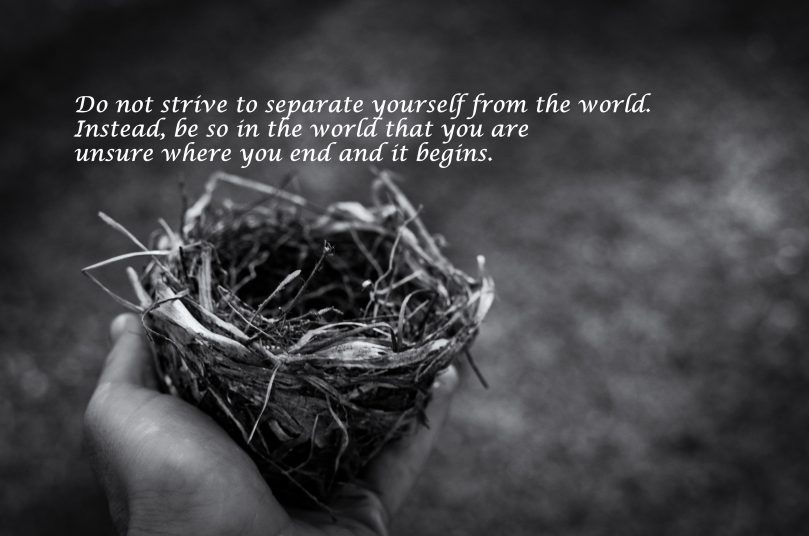
Tag: Zen


101. Buddha’s Zen
Buddha said: “I consider the positions of kings and rulers as that of dust motes. I observe treasures of gold and gems as so many bricks and pebbles. I look upon the finest silken robes as tattered rags. I see myriad worlds of the universe as small seeds of fruit, and the greatest lake in India as a drop of oil on my foot. I perceive the teachings of the world to be the illusion of magicians. I discern the highest conception of emancipation as a golden brocade in a dream, and view the holy path of the illuminated ones as flowers appearing in one’s eyes. I see meditation as a pillar of a mountain, Nirvana as a nightmare of daytime. I look upon the judgment of right and wrong as the serpentine dance of a dragon, and the rise and fall of beliefs as but traces left by the four seasons.”
Photo by Luca Iaconelli on Unsplash

100. The Silent Temple
Shoichi was a one-eyed teacher of Zen, sparkling with enlightenment. He taught his disciples in Tofuku temple.
Day and night the whole temple stood in silence. There was no sound at all.
Even the reciting of sutras was abolished by the teacher. His pupils had nothing to do but meditate.
When the master passed away, an old neighbor heard the ringing of bells and the recitation of sutras. Then she knew Shoichi had gone.
Photo by Robin Benad on Unsplash

99. Tosui’s Vinegar
Tosui was the Zen master who left the formalism of temples to live under a bridge with beggars. When he was getting very old, a friend helped him to earn his living without begging. He showed Tosui how to collect rice and manufacture vinegar from it, and Tosui did this until he passed away.
While Tosui was making vinegar, one of the beggars gave him a picture of the Buddha. Tosui hung it on the wall of his hut and put a sign beside it. The sign read:
“Mr. Amida Buddha: This little room is quite narrow. I can let you remain as a transient. But don’t think I am asking you to help me to be reborn in your paradise.”
Photo by Piron Guillaume on Unsplash

98. Non-Attachment
Kitano Gempo, abbot of Eihei temple, was ninety-two years old when he passed away in the year 1933. He endeavored his whole life not to be attached to anything. As a wandering mendicant when he was twenty he happened to meet a traveler who smoked tobacco. As they walked together down a mountain road, they stopped under a tree to rest. The traveler offered Kitano a smoke, which he accepted, as he was very hungry at the time.
“How pleasant this smoking is,” he commented. The other gave him an extra pipe and tobacco and they parted.
Kitano felt: “Such pleasant things may disturb meditation. Before this goes too far, I will stop now.” So he threw the smoking outfit away.
When he was twenty-three years old he studied I-King, the profoundest doctrine of the universe. It was winter at the time and he needed some heavy clothes. He wrote his teacher, who lived a hundred miles away, telling him of his need, and gave the letter to a traveler to deliver. Almost the whole winter passed and neither answer nor clothes arrived. So Kitano resorted to the prescience of I-King, which also teaches the art of divination, to determine whether or not his letter had miscarried. He found that this had been the case. A letter afterwards from his teacher made no mention of clothes.
“If I perform such accurate determinative work with I-King, I may neglect my meditation,” felt Kitano. So he gave up this marvelous teaching and never resorted to its powers again.
When he was twenty-eight he studied Chinese calligraphy and poetry. He grew so skillful in these arts that his teacher praised him. Kitano mused: “If I don’t stop now, I’ll be a poet, not a Zen teacher.” So he never wrote another poem.
Photo by Simon Matzinger on Unsplash

97. Teaching the Ultimate
In early times in Japan, bamboo-and-paper lanterns were used with candles inside. A blind man, visiting a friend one night, was offered a lantern to carry home with him.
“I do not need a lantern,” he said. “Darkness or light is all the same to me.”
“I know you do not need a lantern to find your way,” his friend replied, “but if you don’t have one, someone else may run into you. So you must take it.”
The blind man started off with the lantern and before he had walked very far someone ran squarely into him. “Look out where you are going!” he exclaimed to the stranger. “Can’t you see this lantern?”
“Your candle has burned out, brother,” replied the stranger.
Photo by Daniil Kuželev on Unsplash

96. A Drop of Water
A Zen master named Gisan asked a young student to bring him a pail of water to cool his bath.
The student brought the water and, after cooling the bath, threw on to the ground the little that was left over.
“You dunce!” the master scolded him. “Why didn’t you give the rest of the water to the plants? What right have you to waste even one drop of water in this temple?”
The young student attained Zen in that instant. He changed his name to Tekisui, which means a drop of water.
Photo by Eric Didier on Unsplash

95. A Letter to a Dying Man
Bassui wrote the following letter to one of his disciples who was about to die:
“The essence of your mind is not born, so it will never die. It is not an existence, which is perishable. It is not an emptiness, which is a mere void. It has neither color nor form. It enjoys no pleasures and suffers no pains.”
“I know you are very ill. Like a good Zen student, you are facing that sickness squarely. You may not know exactly who is suffering, but question yourself: What is the essence of this mind? Think only of this. You will need no more. Covet nothing. Your end which is endless is as a snowflake dissolving in the pure air.”
Photo by Aaron Burden on Unsplash

94. Midnight Excursion
Many Zen pupils were studying meditation under the Zen master Sengai. One of them used to arise at night, climb over the temple wall, and go to town on a pleasure jaunt.
Sengai, inspecting the dormitory quarters, found this pupil missing one night and also discovered the high stool he had used to scale the well. Sengai removed the stool and stood there in its place.
When the wanderer returned, not knowing that Sengai was the stool, he put his feet on the master’s head and jumped down into the grounds. Discovering what he had done, he was aghast.
Sengai said: “It is very chilly in the early morning. Do be careful not to catch cold yourself.”
The pupil never went out at night again.
Photo by Shoot N’ Design on Unsplash

92. Fire-Poker Zen
Hakuin used to tell his pupils about an old woman who had a teashop, praising her understanding of Zen. The pupils refused to believe what he told them and would go to the teashop to find out for themselves.
Whenever the woman saw them coming she could tell at once whether they had come for tea or to look into her grasp of Zen. In the former case, she would serve them graciously. In the latter, she would beckon to the pupils to come behind her screen. The instant they obeyed, she would strike them with a fire-poker.
Nine out of ten of them could not escape her beating.
Photo by Martin Jernberg on Unsplash